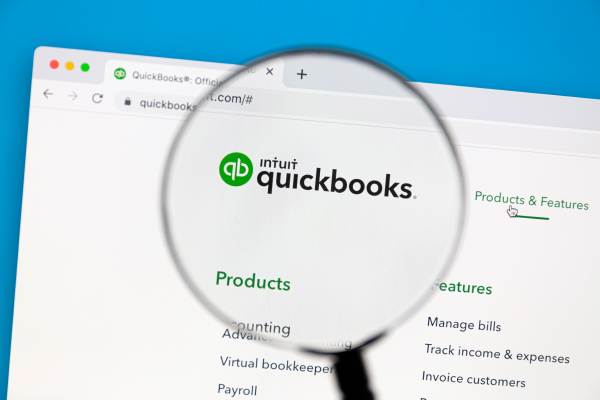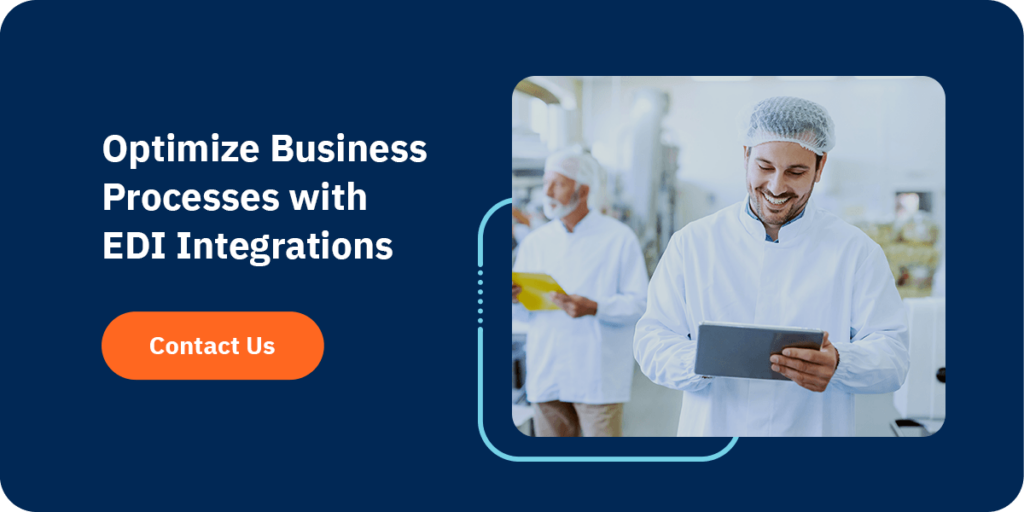5 Benefits of QuickBooks EDI Integration

February 27, 2024
While Intuit QuickBooks offers robust tools across diverse industries and tasks, it doesn’t address all areas of business, which is why many companies use it in concert with other programs that can handle more complex demands. An electronic data interchange (EDI) system is one such program, allowing you to connect your QuickBooks data with EDI transactions and other business platforms, such as customer relationship management (CRM) and supply chain management systems.
By integrating QuickBooks with your systems and partners, you can readily exchange data and reap benefits ranging from more efficiency to improved visibility.
What Can You Do with a QuickBooks EDI Integration?
QuickBooks EDI integrations facilitate a massive range of activities by connecting diverse business systems and trading partners. These connections allow you to automate many processes and workflows involving your QuickBooks data. Whether you want to automate a simple task or create a complex network of custom activities, EDI integrations can help.
Most of QuickBook’s basic features revolve around financials — such as billing, payroll processing, and reporting — but integrations expand its capabilities in areas such as enterprise resource planning (ERP) and warehouse or supply chain management. An EDI integration can sync information between platforms, use data from different systems to generate EDI transactions, and update systems with data from incoming transactions.
For example, you can use it to update stock counts between your ERP and QuickBooks or use inventory data from QuickBooks to quickly send an invoice to a trading partner. Another example includes automatically analyzing an incoming order and updating the relevant information in QuickBooks. With an EDI app, you can access these features directly within the QuickBooks interface.
5 Benefits of Integrating QuickBooks with EDI
An EDI integration supports the full spectrum of business processes in QuickBooks, regardless of which QuickBooks product you use. From enhanced visibility to exceptional productivity, implementing EDI within QuickBooks offers the following powerful benefits.
1. A Single Source of Information
Traditionally, EDI transactions require considerable manual entry. Your team would need to enter the data from each transaction into the corresponding system before you could move the order along. If information changes in one system, the other one also needs updating. Otherwise, you may work with inaccurate or outdated information.
With an integration, these steps happen automatically, so your data stays consistent everywhere. If a retailer order changes your stock counts, they’ll update accordingly in QuickBooks and your ERP — without waiting for someone to type them in. If another trading partner needs to place an order, you know the new order won’t cause a stockout because the counts they receive reflect the previous change.
Consistent data across systems allows you to make decisions more confidently and ensure your processes are accurate. It’s also essential if you work with multiple trading partners.

2. Streamlined Transaction Processing
Manually entering data into QuickBooks is extremely time-consuming, especially if you have high order volumes. It uses up your team’s valuable time and causes delays to your order cycle while you wait for someone to enter information. Human error can also lead to more inaccuracies and increase hiring demands during times when you need to scale. A QuickBooks integration avoids all of these issues by automating EDI transaction handling and offering fast access right from the QuickBooks interface.
With the right integration, you can:
- Speed up your order cycle: Send orders to the next step automatically and without delays. You can even process them outside normal working hours, greatly improving fulfillment during evenings and weekends. A faster order usually comes with a stronger cash flow, too.
- Avoid errors from manual entry: Even your most diligent team members will make typos and other errors when entering data into or from QuickBooks. Along with extensive costs, these errors require time to fix, slowing down your processes.
- Improve customer satisfaction: Today’s sellers offer impressive fulfillment speeds. EDI for QuickBooks can help you stay competitive by improving processing times. It can also improve the customer experience through capabilities such as shipping updates and more informed customer service representatives. For example, connecting QuickBooks transactions to your CRM can ensure your support team has the most updated and relevant information.
- Reduce costs: A faster process and reduced labor requirements can increase the productivity and efficiency of your team. All of these benefits can help reduce costs and boost revenue, allowing you to focus more on your overarching goals.
3. Fewer Errors
One study found that error rates in manually processed clinical data ranged from 2 to 2,784 errors per 10,000 fields. Small errors can create big costs, such as the labor and expenses of fixing problems, regulatory fines, chargebacks, and lost sales due to reputational impacts. By automating data entry and reducing human involvement, EDI can limit these effects in QuickBooks and other systems.
EDI integrations also support fewer errors in your transactions. Since many trading partners have strict requirements for EDI transactions, staying compliant is crucial for maintaining positive relationships and reducing problems associated with inaccurate transactions.
4. Easy Scalability
When using manual processes, scaling your business or responding to demand fluctuations calls for complex hiring requirements. You must invest in recruitment, training, benefits, and other hiring needs. It also takes time and increases the strain on your HR team.
A QuickBooks EDI integration doesn’t need any extra team members to handle an increase in transactions. It offers unparalleled flexibility that you can use to grow a business or respond to seasonal demand. Scalability also gives you more freedom to take on larger projects while keeping your costs steady and predictable.
5. Reduced Costs
All of these benefits contribute to lower costs throughout the order cycle. An EDI solution for QuickBooks can:
- Reduce your hiring and labor costs with faster, automated processing and scalability.
- Limit stockouts and overselling with more accurate data synced between QuickBooks and other systems.
- Avoid costly and time-consuming errors from manual data entry.
- Scale your EDI transaction processing to meet demand and maximize revenue.
- Improve customer satisfaction, ideally increasing sales and reducing customer service demands.
However you use a QuickBooks EDI integration, you can be confident in its ability to support faster, more accurate, and more profitable business processes.
Optimize Business Processes with EDI Integrations

An EDI integration for QuickBooks can help at every stage of the order cycle, bringing these benefits to businesses of all types. Incorporating your EDI solution into QuickBooks offers easy and fast access and enables diverse automation.
Gaining these competitive advantages requires an experienced, knowledgeable integration partner — TrueCommerce is a trusted leader in EDI with over 15 years as an Intuit QuickBooks partner. Contact us to learn more about a QuickBooks EDI integration and see the platform in action.
Share this post:
Categories
Stay ahead of the competition
Get expert supply chain insights delivered directly to your inbox weekly.